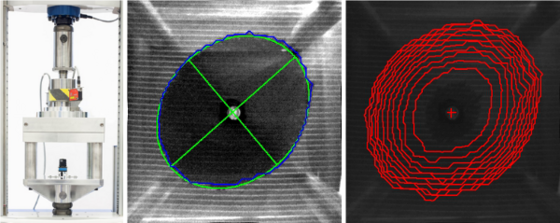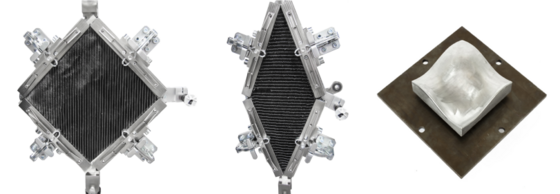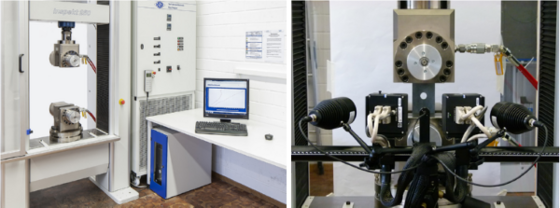
Luciano Avila Gray, M.Sc.
Research Group Leader
Tel.: +49 (89) 289 - 15203
Mobile +49 (152) 22947210
E-Mail: luciano.avila-gray@tum.de
Process technology oriented testing
With the objective of supporting both manufacturing processes and process simulation, the LCC performs and develops several process oriented test methods.
Permeability and Compaction
Permeability and compaction of dry textiles strongly influences resin infiltration technologies such as vacuum infusion (VARI, VAP, etc.) and RTM. The 2D permeability test rig installed at the LCC mechanical laboratory allows a detailed study of various possible influences on the permeability of fabrics such as the type of textile, stacking sequence, laminate thickness, binder material, compaction, etc.
Drapeabiltiy
Composite parts are generally formed by a layup of a laminate over a more or less complex geometry. In particular for complex double-curved shapes it can be a challenge to keep control over the fiber architecture and orientation. The drapeability of various reinforcing textiles is investigated at the mechanical laboratories by means of the picture frame, hemisphere or double sinus stamping tests. The picture frame test is well suited to determine the shear modulus of the textile, the locking angle or the viscous behavior of pre-impregnated textiles. The hemisphere and double sinus stamping tests serve as validation methods for draping simulation and give a qualitative measure of the drapeability.
Mechanical characterization of composites
The main objective of carbon composite materials development is to obtain superb mechanical properties, in particular high specific stiffness, strength and damage resistance. At the LCC mechanical laboratory a great variety of standard and non-standard mechanical tests can be performed in order to obtain mechanical material parameters. In addition small-scale structural and subcomponent tests may take place.
Equipment
For the mechanical characterization, the following instruments are available:
• Universal test machine, Hegewald & Peschke Inspekt 250, ±250 kN load capacity
• Universal test machine, Hegewald & Peschke Inspekt Table 100, ±100 kN load capacity
• Additional load cell, ±10 kN load capacity, applicable to both test machines
• Thermal chamber, temperature range: -40°C to +350°C, 250kN test machine only
• Universal amplifier, HBM MX840A, 8-channels, used for strain gauge applications
• Optical system, GOM ARAMIS-4M, 2d or 3d displacement and strain field measuring




